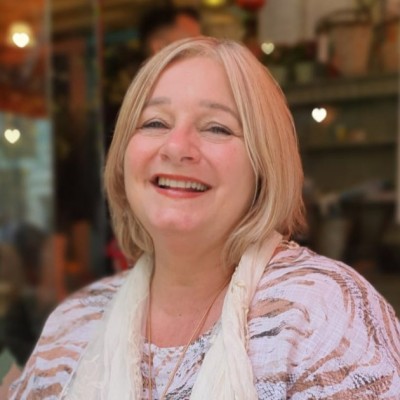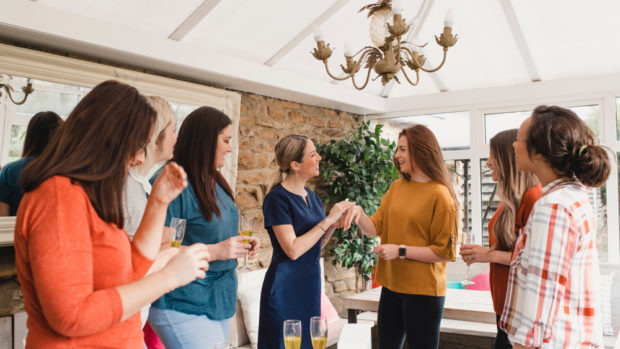
Given his background as a Commercial Banker of 25 years standing, it makes perfect sense that when Jeff Pert wanted to try out running a business for himself, he did so by joining The Cashmere Centre as their Financial and Operations Director, back in 2002.
The company had been founded 4 years previously, in North Buckinghamshire, by Dale Stillman, who concentrates on the product and marketing aspects.
Q: How did the company get started?
A: After leaving university with a Geography degree, Dale started working for a mail order company whilst saving to travel. After a year learning the ropes and then travelling for a further year, he realised he would like to give it a go himself, so started The Cashmere Centre in 1999, initially just selling Pashminas. Over the years, The Cashmere Centre has diversified into a broader range of high-quality cashmere knitwear and over 100,000 customers have purchased from us, producing a turnover of over £2.5 million last year. Additional brands have taken sales to over £6.5m last year
Q: Cashmere is a competitive market, so what sets your products apart
A: Our focus has always been on quality clothing, using high-quality natural fibres from Mongolian goats. True cashmere wool comes from a particularly fine-haired breed known as Capra aegagrus hircus, or the ‘pashmina goat’ as it is known in the Urdu dialect. The cashmere we use is pure white grade ‘A’ cashmere, which is combed from the goats in the spring when goats will naturally moult their winter hair. Combing is better than shaving, and is a centuries old practice which does not harm the animal in any way.
We have been dealing with the same factories for over 10 years and every piece is controlled and inspected by us to the highest specifications.
What sets us apart is the attention to the small details using traditional ways such as hand linked and seamed sweaters that avoids any lumps under the seams. We are also keen to ensure our garments are ethically produced.
There are many different grades of cashmere and also many different manufacturing techniques. We believe our products keep their shape and do not pill as easily as thinner versions. Our service levels and guarantees also give our customers confidence in the quality of our products
Q: How has the company evolved over the years?
A: We have grown steadily, with a very loyal customer base. Much of our business is repeat sales and via word of mouth. We have many customers who have been with us from day one and who buy all of their cashmere from us on a regular basis. We understand our customers, so we launched a number of companies that sell complementary products, designed to appeal to our customer base.
2010 saw the launch of The Pearl Company, selling a range of genuine pearl jewellery from around the world. The demographics of our customers fitted the bill, although buyers have a slightly younger profile. It has become a thriving company in its own right, enjoying steady growth in sales and the range of items we offer.
In 2012 we set up James Alexander Clothing (taken from the middle names of Dales’ two sons), as a sister brand, also selling luxury fibre products, including Yak, Mohair, Alpaca, Camel, Merino wool, sheepskin and Harris Tweed. As quality fibre experts, we have selectively grown our product range. Shrugs, snoods, gilets and mohair bed socks are amongst our best sellers, helping us to achieve around £1millon turnover.
In 2016 we introduced a management team to facilitate further growth and launched Tesoro by Design, (Spanish for treasure), selling Gem jewellery, silk scarves, handbags etc
More recently, we bought out the well-known clothing company, Spirit of The Andes, which was established in 1993 and sells Alpaca based products from Peru and pima cotton clothing.
All our knitwear across the brands is designed in the UK by our in-house designer. We offer a more classic look rather than high end designer fashion and can count ex- prime ministers’ wives and prime time newsreaders amongst our clientele.
Q: How do you manage call handling and fulfilment?
A: We have always managed all the calls in-house, but with the expansion of companies, we have recently started working with a supplementary call centre ZoomFS, whose service levels match our own. Our customer profile is affluent, age 60 plus, which explains why 65 per cent of our sales coming in via the telephone.
Our team of 15 telephone staff also rotate on undertaking the picking and packing in our own warehouse near Milton Keynes. We feel it gives them a better appreciation and understanding of the products. During our peak season from September to October and January and February, we have an additional temporary staff to help. Our mail order management system has been in place for a few years now but remains very effective.
Q: How did you cope during lockdown?
A: Like everyone else, we found a way to get through it. Our staff were able to work from home, taking calls and we had a skeleton staff in the warehouse. During March and April 2020 our sales literally halved, so it was a very scary time. We also had supply issues. But fortunately, sales have been steadily picking up and from October 2021 sales went crazy. During lockdown we saw an increase in sales of most things but specifically slippers and lounge wear.
Q: How do you support sustainability?
A: We work closely with our suppliers to ensure fair pricing and ethical trading and try and visit their sites at least once a year (covid permitting!). We also work closely with those communities that are less fortunate to create a better quality of life through education, transport and technology. We’re passionate about making sure that we create a closed-loop process. We have a very good relationship with our factory that is based just outside of Kathmandu in Nepal. It is a big employer in the area and after the earthquake in 2015 which killed one of their employees and damaged buildings, we organised fundraising for them. We also support their local school.
In addition, our products are sustainable, as they are designed to be long-lasting, investment pieces rather than ‘throw-away’ clothing that only lasts a couple of years. We feel our cashmere improves with age and can last a lifetime. Our service to repair rather than replace is designed to extend the life of clothing, meaning that whatever the brand, as long as it is pure cashmere, we can restore the garment to prolong its life.
We also have a recycling scheme, whereby customers can trade in their old, unused cashmere, and we’ll send them a £20 gift voucher to spend at any of our five luxury brands plus a FREE pair of recycled cashmere fingerless gloves.
Closer to home, we are trying to reduce our energy consumption by using movement-activated LED lighting, plus solar panels on our office roof. We also ensure all our catalogues are produced using paper from sustainable sources and ensure our mailing bags are fully recyclable.
Q: Is your marketing mix changing?
A: We recognise the need to become more digitally focused, and our online sales currently represent around 30 per cent of our sales. We do still get orders by post with a cheque!
Given the older age profile, our loyal customers do like to flick through a physical catalogue. Our recycled paper catalogues for Autumn/Winter go out in September, with an end of season sale in August. Our Spring catalogue comes out on 1st March. We still use off -the- page ads in titles such as You Magazine and The Telegraph.
Product dispatch inserts are used to cross-sell between our other brands. We are now looking at inserts into press.
We have been a bit slow in embracing email marketing to be honest and we only introduced this around four years ago. Last year we started doing it properly and it is already paying dividends. Our customers are fantastic, and I enjoy new challenges and seeing what works.
We have a social media manager and two eCommerce experts, who looks after our website and PPC etc. We have also recently introduced new software from SalesFire, offering website popups etc for a more personal customer experience, designed to optimise conversion rates, re-engage lapsed customers and provide a more relevant visitor experience. We try and upsell by promoting add on products like moth prevention cedar blocks and cleaning care products.
We do undertake Direct Mail and are part of the Abacus data alliance.
We did open a retail store, called House of Buckingham near Milton Keynes, which was offering all five, luxury clothing and jewellery brands under one roof. It was unfortunately closed due to covid, but we hope to reopen at a new site in the spring.
Q: What do you get out of your DCA membership?
A: We have been members of the DCA for ten years now. We try and attend as many DCA members groups as possible. I especially enjoy the Behind Closed Doors sessions, which are really useful and delivered some practical nuggets of wisdom. It is a great way of sharing knowledge and expertise. I am always keen to learn, and this business offers new challenges every day, which is great because I hate standing still.








Share